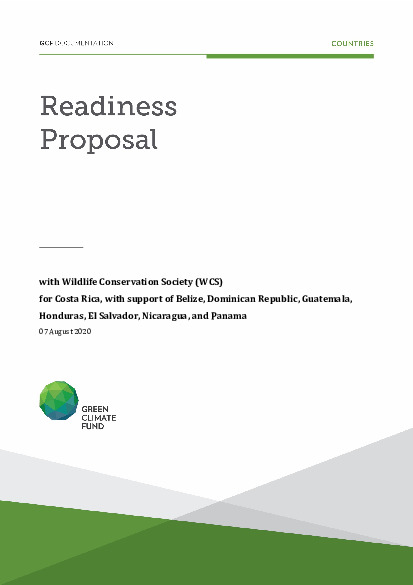Strategic Regional Readiness to Enable Resilience of Mesoamerica’s 5 Great Forests and Communities

Strategic Regional Readiness to Enable Resilience of Mesoamerica’s 5 Great Forests and Communities
This proposal seeks funding to support the Governments of Central America to leverage regional and international cooperation in support of nature-based climate change solutions (NBS) within Mesoamerica’s Five Great Forests, and other key forest areas in the region.
Central America is one of the world’s most vulnerable regions to climate change, and is already experiencing longer, drier, and hotter dry seasons and more frequent tropical storms and hurricanes. Climate change has direct impacts on access to drinking water, crop failure and food insecurity, disease outbreaks, forest fires, biodiversity loss, hydroelectric power, and natural disaster, exacerbating existing social and economic vulnerabilities.
Mesoamerica’s last five great forests are critical to the region’s climate and overall security. The five forests—the Maya Forest in Mexico, Guatemala, and Belize; the Moskitia in Nicaragua and Honduras; Indio Maíz-Tortuguero in Nicaragua and Costa Rica; the Talamanca Region in Costa Rica and Panama; and the Darien in Panama and Colombia— span from Mexico to Colombia, are three times the size of Switzerland, hold more than 500,000 Indigenous, afro-descendant, and mestizo people, and provide critical resources including water, food, and other ecosystem services, which support local people and national economies. Yet since 2000, three of Mesoamerica’s five great forests have been reduced by more than 23 percent, with ninety percent of deforestation resulting from illegal cattle ranching.
Mesoamerica’s Five Great Forests Initiative is a critical pillar of the region’s climate strategy and is essential to ensure the resilience of Indigenous and local forest-dependent communities. However, the region currently lacks the resources, analyses, and capacity to develop a regional GCF programme.
This application builds on the Wildlife Conservation Society’s ongoing work with the Central American Commission for Environment and Development (CCAD), and its constituent member countries, and the Mesoamerican Alliance of Indigenous Organizations (AMPB) to identify projects and programmes for nature- based climate solutions (NBS) and build the capacity of governments and Indigenous and local communities to engage in national and regional decision making and to catalyze a model for sustainable regional development in Central America that protects the 5 Great Forests, as well as other critical forest areas such as Trifinio Biosphere reserve in El Salvador, Guatemala and Honduras, and the Osa Peninsula in Costa Rica. This programme for Mesoamerica’s five great forests reflects a regional approach that is complementary to and congruent with the “Ecosystem-based Adaptation to increase climate resilience in the Central American Dry Corridor and the Arid Zones of the Dominican Republic" programme under preparation.
The Costa Rica NDA will serve as the primary project proponent, with support from seven other countries in the region, and the Wildlife Conservation Society serving as delivery partner. Readiness funding will be used to create the enabling conditions for countries and Indigenous Peoples in Mesoamerica to collaboratively develop and engage in a regional GCF programme focused on the resilience of Mesoamerica’s Five Great Forests and the communities who depend on them. Specifically, a technically sound regional concept note will be developed and submitted to the GCF, aligned with national GCF project pipelines.
Support will help Central America develop new approaches to climate change mitigation and adaptation and expand its access to GCF funding, contributing to achieving greater climate resilience as well as increased NDC ambitions for announcement in COP26 in Glasgow and beyond.
The direct beneficiaries of the readiness support include (1) NDAs in Belize, Costa Rica, Dominican Republic, Guatemala, Honduras, El Salvador, Nicaragua and Panama and (2) Indigenous and vulnerable communities (~500,000 people) in 8 countries who live in and around the forests.